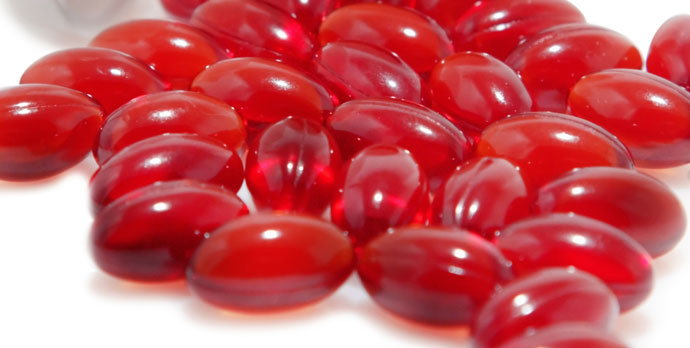Krill live in the open sea, and congregate in dense swarms of more than 10,000 individuals per cubic meters of water, where they become a vital food source for many marine animals, including whales, seals and penguins. I don't like to promote krill oil as a dietary supplement for several reasons, find out why. Leave this tiny crustacean in the oceans please, it is a major part of the oceanic food chain, our whales depend on it as their food source.

What’s important for you to understand is that krill oil is very cheap to harvest. It’s cheap because it is plundered out of the ocean in a way that many now believe to be totally ecologically irresponsible and completely insensitive to the marine mammals that depend on krill as their primary food source.
Rather than responsibly using aqua-culture farms (like green-lipped mussel farms) where nothing is taken away from the ocean ecosystem, krill oil is removed from the open ocean where whales and other marine mammals feed. Krill are at the bottom of the food chain in the oceans, and countless aquatic species depend on a large krill supply to survive.
 Many penguin, whale, and fish species feed primarily on krill. This includes the blue whale, the largest mammal to have ever existed on the planet. Blue whales eat nearly solely krill and require a large amount of the microscopic crustaceans to stay alive, roughly 4 tonnes each day. A fully grown hippopotamus weighs nearly that much.
Many penguin, whale, and fish species feed primarily on krill. This includes the blue whale, the largest mammal to have ever existed on the planet. Blue whales eat nearly solely krill and require a large amount of the microscopic crustaceans to stay alive, roughly 4 tonnes each day. A fully grown hippopotamus weighs nearly that much.
Yes, whilst it is true that there is a lot of total krill in the ocean, but what concerns marine biologists is the harvesting of krill concentrations near the feeding grounds of whales and other marine mammals. With many of these marine species already threatened and stressed by climate change, their feeding grounds are being eroded or altered in a way that poses a very real danger to the sustainability of local marine mammal populations.
To add the stress of a reduced food supply (krill harvesting) to that equation is an activity that deserves to be critically reviewed. Tough questions need to be asked, which is why even National Geographic Magazine warns about the 80 percent drop in krill populations over the last few decades 1. Are you still interested in buying Krill oil?
Fishing in the Arctic, where many krill live, is being destroyed by overfishing. The oceans are being stressed globally. Recently, the North Pacific Fishery Management Council (NPFMC) voted to ban ALL commercial fishingin U.S. waters north of the Bering Straight due to the devastation being caused by unregulated commercial fishing. As quoted in the Washington Post, council aide Bill Wilson said, “There’s concern over unregulated fishing, there’s concern about global warming, there’s concern about how commercial fishing might affect resources in the region, local residents and subsistence fishing and the ecosystem as a whole.”
The Marine Conservation Alliance (MCA) also supports the ban on commercial fishing in Arctic waters, another reason why Arctic Cod Oil is not a good option. Other supporters include the Ocean Conservancy, the Pew Environmental Group and Oceania.
The fact is that many reputable scientists have publicly expressed their concern over this reduction in the food supply of marine mammals, many of which are living on the edge of survivability due to factors such as global warming.
The truth is that marine biology is a very complex thing, and those who think they can plunder the oceans in a non-renewable way are acting with the same arrogance as Easter Island inhabitants who destroyed their entire civilization through runaway deforestation 2. Indeed, the wild harvesting of krill is a lot like chopping down old growth forest trees without planting any new ones. Harvesting green-lipped mussels in aquaculture farms is like planting your own trees, then harvesting them after a few years and re-planting more trees on the same acreage – it is sustainable.
For thousands of years, humans have operated with the belief that they could plunder the oceans without consequence. Through most of human history, they were right. But today, the massive scale of ocean harvesting of various food sources has reached the point of global collapse. Now is the time that intelligent, courageous voices must stand up and question the practice of harvesting of ocean life without limits. This stance isn’t a “scare story,” it is a conscious act of well-informed concern for the sustainability of life on our planet, much of which depends on the biodiversity of the oceans.
The foods and supplements we choose to consume on a regular basis have a lasting impact on the future of our planet. For those who don’t care about the future of life on Earth, feel free to eat hamburgers and take supplements that are unsustainably harvested from land or the oceans. But for the more compassionate, connected and well-informed individuals who understand that their choices do, indeed, ripple out through the living systems on our planet, the plundering of the ocean’s krill populations deserves skeptical consideration.